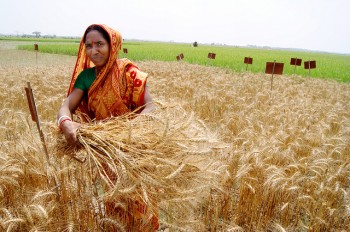India
For more information, contact CIMMYT’s India office.
Cereal Systems Initiative for South Asia enters Phase III: focus on scalability and strategic partnerships
 Nutrition, health and food security
Nutrition, health and food security
Paula Kantor Award nominees must show gender research success in India
 Gender equality, youth and social inclusion
Gender equality, youth and social inclusion
A new award recognizes contributions to the livelihoods and economic empowerment of women made by a former giant in the field of international gender research.
Supporting sustainable and scalable changes in cereal systems in South Asia
 Climate adaptation and mitigation
Climate adaptation and mitigation
The rates of growth of staple crop yields in South Asia are insufficient to meet the projected demands in the region. With 40 percent of the world’s poor living in South Asia, the area composed of eastern India, Bangladesh and Nepal has the largest concentration of impoverished and food insecure people worldwide.
India visit: Dr. Martin Kropff, Director General, CIMMYT
 Capacity development
Capacity development
Summary of CIMMYT Director General Martin Kropff visit to different research sites in several states of India, 28 September – 2 October, 2016.
Zero-till wheat raises farmers’ incomes in eastern India, research shows
 Climate adaptation and mitigation
Climate adaptation and mitigation
Replacing gender myths and assumptions with knowledge
 Gender equality, youth and social inclusion
Gender equality, youth and social inclusion
If we are to be truly successful in improving the lives of farmers and consumers in the developing world, we need to base our interventions on the best evidence available.
The first heat tolerant maize hybrids are licensed for deployment in Bangladesh, India and Nepal
 Climate adaptation and mitigation
Climate adaptation and mitigation
AAA hybrids move towards commercialization
 Climate adaptation and mitigation
Climate adaptation and mitigation
PLC6 is a term used to refer to an advanced stage of hybrid testing at Syngenta, a partner of the Affordable, Accessible, Asian (AAA) Drought Tolerant Maize Project. Four hybrids, representing combinations of Syngenta and CIMMYT germplasm are currently at PLC6 in big plots at multiple locations. The trajectory of this process points to pilot marketing of a limited quantity of hybrid seed in 2016 and a full market launch in 2017.
Tech-savvy women in Haryana implement precision fertilizer application
 Capacity development
Capacity development
The state of Haryana, India’s breadbasket, faces a major challenge due to the excessive use of nitrogen fertilizer (N: P: K = 27.2: 9.8: 1) in agriculture. The overuse of nitrogen fertilizer in the rice-wheat systems of Haryana has led to high production costs, low efficiency, environmental pollution and nitrate contamination of groundwater, which causes blue baby syndrome in young children.
Training on developing stress-resilient maize at CIMMYT-Hyderabad, India
 Capacity development
Capacity development
A training course on developing stress-resilient maize for early-/mid-career maize breeders from national programs, agricultural universities and seed companies, especially small and medium enterprises (SMEs), was held at CIMMYT-Hyderabad, India, on 15 May 2015. The course was open to partners in the Heat Tolerant Maize for Asia (HTMA) project and members of the International Maize Improvement Consortium (IMIC-Asia). It covered key aspects of precision phenotyping, including enhancing precision of field trials, managing adequate levels of stress to express available genotypic variability, using advanced tools to capture data efficiently and precision in recording various traits in phenotyping trials.
CIMMYT-CCAFS initiative develops 500 new climate-smart villages in Haryana, India
 Climate adaptation and mitigation
Climate adaptation and mitigation
Fostering collaboration between Nepalese and Indian seed companies
 Capacity development
Capacity development
A delegation of 15 Nepalese seed entrepreneurs learned about various business models and innovations for seed industry development on their first visit to India. The visit, sponsored by the Cereal Systems Initiative for South Asia in Nepal (CSISA-NP), lasted from 1 to 10 June.
